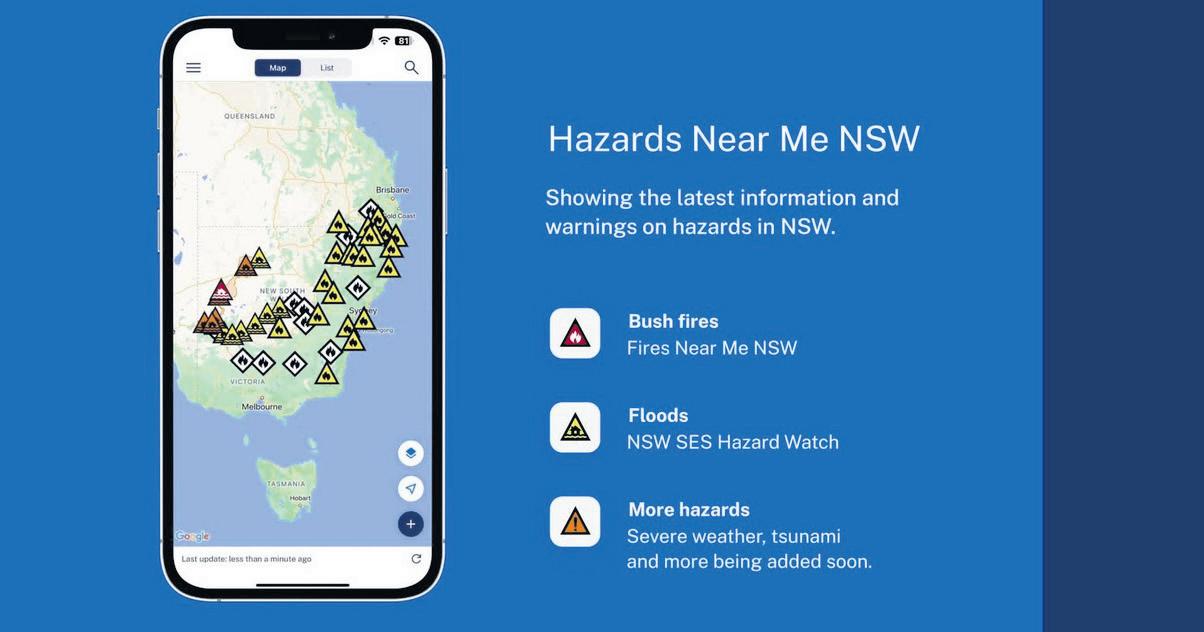
3 minute read
FLOOD ALERTS AT YOUR FINGERTIPS
Residents across NSW can now receive the latest food and fre warnings in the palm of their hands, with the launch of the NSW Liberal and Nationals Government’s Hazards Near Me app.
The widely used Fires Near Me app, which has more than four million users, has been expanded and renamed to include food alerts from the NSW State Emergency Service (SES), delivering on a key recommendation of the independent Flood Inquiry.
Minister for Customer Service and Digital
Government Victor Dominello said it is critical for the community to have access to the latest information when it matters most.
“Being informed in an emergency situation can save lives, and the Hazards Near Me app will help people stay safe during fres, foods and other natural disasters,”
Mr Dominello said.
“The app has been jointly developed by the Department of Customer Service, SES and NSW Rural Fire Service (RFS), and I’m excited that app users will see additional features roll out in the future.”
Minister for Emergency Services and Resilience and Minister for Flood Recovery Steph Cooke said empowering people with information is key to improving emergency responses.
“The independent Flood Inquiry identifed the need for a single source of advice that can provide warnings for different types of hazards, and this app delivers on our commitment,” Ms Cooke said.
“In an emergency every minute counts. Hazards Near Me will provide reliable and timely information directly from emergency services so people can make decisions to keep themselves and their families safe.”
RFS Commissioner Rob Rogers said the NSW community has shown how important apps are during emergencies.
“For more than a decade, the NSW community has used Fires Near Me for bush fre information, and with nearly three million downloads during the 2019-20 bush fre season, it’s a trusted source for fre information and warnings,” Commissioner Rogers said.
“The Hazards Near Me app builds upon this experience, familiarity and extensive user base by allowing people to see localised and customised information based on the hazards in their area.”
SES Commissioner Carlene York said the app is another way that emergency services can alert the community when action is required.
“In recent months, the SES has delivered a new approach to food warnings in NSW through the adoption of the three-level Australian Warning System,” Commissioner York said. “The app will not only show where foods are happening and what people should do, but also alert users when new information is available so they can stay up-to-date and make safe decisions”.
Existing users of Fires Near Me will need to update their app through their phone’s app store. New users can download the app by searching for ‘Hazards Near Me’ in their app store.
Pollies tackle tough topics at regional debates
Potholes, solar panels and compulsory land acquisition are some of the biggest issues to emerge from NSW Farmers’ election debate series, which is set to heat up in the fnal two weeks.
The energy transition and its impact on country communities has emerged as a major issue during four debates hosted by NSW Farmers, alongside road and rail repair, water security and climate policies.
Ministers, shadow ministers and minor parties faced tough questioning during the debates in Goulburn, Bega, Armidale and Muswellbrook, and NSW Farmers Head of Policy Annabel Johnson said people wanted to know how the next government would make things better.
“This is going to be a very tight election with the cost of living crisis hurting everyone, families and farmers alike, and they’re wanting to know what will be done about it,” Ms Johnson said.
“Roads range from ordinary to terrible across the state, and at the same time there’s this huge land development pressure – people are feeling like things are being done to their communities without any consultation.
“For those people who have their land compulsorily acquired for big new projects, there’s a real question around whether they’re being treated fairly and getting paid enough.”
The community of Merriwa, in the
Upper Hunter, was a prime example of the pressures facing rural areas, Ms Johnson said.
Situated on the Golden Highway between Newcastle and Dubbo, Merriwa will become a major thoroughfare for trucks and workers building renewable energy projects. Locals raised concerns about schoolchildren crossing highway to access sporting felds, and feared Sydney-style traffc jams without urgent intervention.
“Locals told the politicians that Merriwa isn’t beneftting from all this new development, but it’s bearing the burden, and it’s just one of many towns facing similar pressures,” Ms Johnson said.










